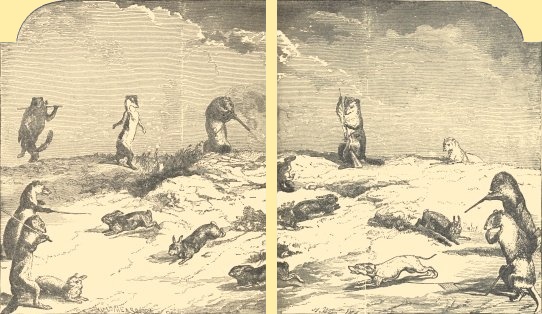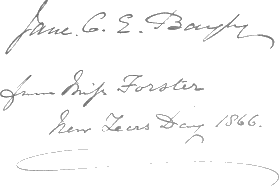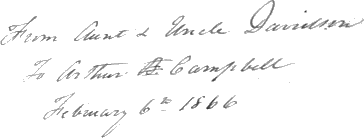PREFACE.
To Herrmann Ploucquet, Preserver of Objects of Natural History at the Royal Museum of Stuttgart,—the capital of the kingdom of Wurtemberg,—we are indebted for one of the cleverest and most popular displays in the Great Exhibition. Every one, from her Majesty the Queen down to the least of the charity-boys, hastens to see the Stuffed Animals from the Zollverein; every one lingers over them and laughs at them as long as the crowd will allow; and every one talks of them afterwards with a smile and a pleasing recollection.
That these clever productions of Ploucquet’s talent may be long perpetuated, we have had daguerreotypes of them taken by Mr. Claudet, and engravings made from them on wood as faithfully like as possible.
We must beg our readers to remember that, excepting “Reynard the Fox,” our sketches have been written to illustrate the drawings, for on this plea we claim some indulgence; but as we know full well that the pictures will be the main attraction of the volume, we are not apprehensive of much criticism.
10The story of “Reynard the Fox” is told briefly in the words of an old version of this wonderful tale published in England many years ago. In Germany Reinecke Fuchs is as popular as our “Jack the Giant-Killer.” Carlyle says, “Among the people it was long a house-book and universal best companion; it has been lectured on in Universities, quoted in imperial Council-halls; it lay on the toilets of princes, and was thumbed to pieces on the bench of the artisan: we hear of grave men ranking it next to their Bible.”
Goethe took the story of “Reynard” for the subject of a great poem; and the famous painter Kaulbach has recently illustrated Goethe’s version with perhaps the finest series of pictures with which a book was ever adorned.
Herrmann Ploucquet has had the good taste to select six of these designs as models for his works. He has admirably preserved the expression which the painter gave to the Fox and his dupes, and every one recognises them with pleasure.
11
CONTENTS.
| PAGE | |
| The Weasels of Holm-Wood | 15 |
| The Wonderful Hare-Hunt | 40 |
| The Duel of the Dormice | 45 |
| The Six Kittens | 49 |
| The Frogs who would a-wooing go | 59 |
| The Story of Reynard the Fox | 63 |
ILLUSTRATIONS.
| The Wonderful Hare-Hunt (Double Plate) | Frontispiece. |
| Dame Weasel and her Family | 14 |
| The Attentive Physician | 17 |
| The very attentive Physician | 21 |
| Old Marten and Sharp Weasel, Esq. | 25 |
| Mr. Bantam’s Interview with Old Marten | 29 |
| Longtail teaching the young Rabbits Arithmetic | 33 |
| Jack Hare and Grace Marten leading off the Ball | 37 |
| The Duel of the Dormice | 44 |
| The Kittens at Tea—Miss Paulina singing | 48 |
| Ensign Squeaker and Miss Rose | 51 |
| Young Marten bidding farewell to Miss Paulina | 55 |
| The Frogs who would a-wooing go | 58 |
| Reynard at Home at Malepardus | 62 |
| Reynard in the likeness of a Hermit | 65 |
| Sir Tibert delivering the King’s Message | 71 |
| Reynard brings forward the Hare as his Witness | 81 |
| Reynard on his Pilgrimage to Rome | 85 |
| Reynard attacketh Laprell the Rabbit | 91 |
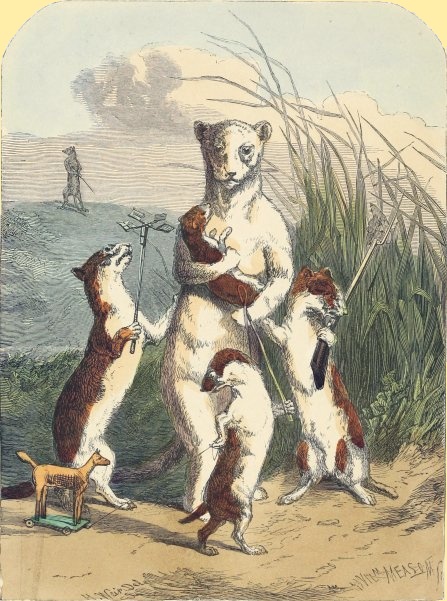
DAME WEASEL AND HER CHILDREN.
15
THE
WEASELS OF HOLM-WOOD.
CHAPTER I.
In a pleasant country where green meadows lay stretched by the side of a broad river whose banks were lined with the pollard-willow and tall poplar, there once dwelt a family of Weasels, known, from their place of residence, as the Weasels of Holm-wood.
Holm-wood was a little island covered with underwood, rushes, and wild flowers. A few aged trees stood by its edge, bathing their long arms in the stream, and in the hollow trunk of one of these the Weasels lived.
16Any fine morning you might have seen the mother of this family carrying her infant in her arms, and followed by her other children, a girl and two boys, who would amuse themselves by dragging little wooden horses, playing at soldiers with mock muskets, running against the wind with little whirligig mills, or frolicking about with a thousand of the antics of children. Their father, known every where as Old Weasel, was of a most resolute and unbending disposition; he made many enemies, and was ever at war with one or other of his neighbours. The Partridges of Clover-field asserted that he sucked their eggs and stole their young ones; the Rabbits of the Warren held Old Weasel and all his family in the deepest abhorrence, and accused them of the greatest cruelties; but no one complained of them more bitterly than Dame Partlett of the Farm, who accused the whole tribe of being born enemies of her race, and said, that were it not that Old Weasel himself was dreadfully afraid of her neighbour and friend, young Mastiff of Kennel-wood, she verily believed that she should never know any peace on earth.
17
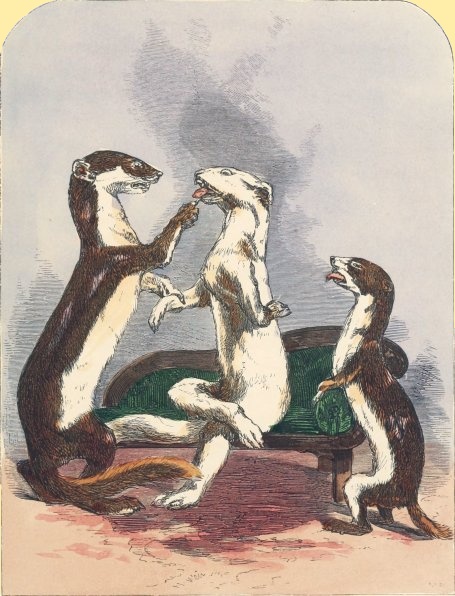
THE ATTENTIVE PHYSICIAN.
All the world will understand how, with such a character, the Weasels had but few friends, and that when Miss Weasel grew to be of age, she should have but few admirers; nevertheless two or three families who were related to them by blood kept up an occasional acquaintance, and among them the Ferrets of Hollow-oak were the most intimate. Now it so happened that one evening, 19 when out for a ramble in the woods, a branch of a tree on which Miss Weasel had mounted in order to get nearer to young Linnet, with whom she wished to be on intimate terms, broke suddenly off, and the poor young lady was precipitated to the ground and sadly hurt. Her cries brought to her assistance her younger brother Tom, who, as soon as he had helped her home, ran for young Ferret, who had lately begun practice as a physician. When the good young doctor came, he found Miss Weasel lying on the sofa, looking very pale and very interesting. He felt her pulse, looked at her tongue, and soon discovered that the lady was more frightened than hurt. However, as he had not many patients, he did not choose to tell all the truth, but prescribing a simple remedy, he ordered her to keep very quiet, and promised to call again on the next day. Whether it was that Miss Weasel had been hurt more than her physician had thought, or whether there were any other inducements, we cannot say; but young Ferret thought it his duty to call at Holm-wood every morning, and sometimes twice a day, for at least a month: and if any one could have seen how frequently he felt Miss Weasel’s pulse, and how anxiously he studied every expression of her face, he would have set down Dr. Ferret as a very attentive at least, if not excellent physician.
When Miss Weasel became somewhat stronger, this good 20 young man would lend his arm for her support during an evening walk, would bring her birds’ eggs and other delicacies, and in many ways endeavour to contribute to her restoration to health.
This went on for some time, till the gossips of the neighbouring village would smile whenever they saw the doctor wending his way towards Holm-wood; and Miss Weasel’s two brothers would immediately leave their lessons, which their sister used to teach them, as soon as ever the physician appeared in sight.
21
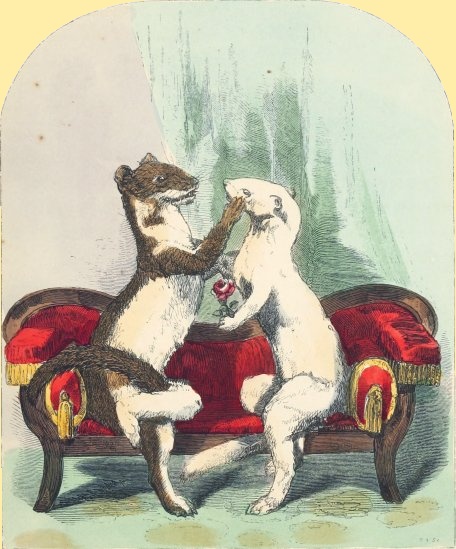
THE VERY ATTENTIVE PHYSICIAN.
23CHAPTER II.
The other relations of the Weasels who were on visiting terms with them were, the Polecats of The Grange, who came but seldom, and the Martens of Forest-farm, with whom they were more intimate. Now old Mr. Marten had always intended that his own son Longtail, who kept a boarding-school for boys near the Warren, should marry Miss Weasel; and when he heard of the physician’s great attentions to that young lady, he was very wroth. At first he thought of way-laying young Ferret in the wood and killing him; but then he recollected that the Ferrets were a powerful family, who would never rest till they had been revenged. His next thought was to go to his attorney, Sharp Weasel, Esq., of Nettle Cottage, and consult with him as to the best means of thwarting young Ferret’s projects. So the old man took down his pipe and his account-book, and set off to the attorney.
24Mr. Sharp Weasel was well pleased to see so excellent a client as old Mr. Marten, and received him with many smiles. The two quickly laid down a plan of proceedings, and Mr. Marten produced his account-book, and proved that young Ferret owed him for the following goods sold and delivered, viz. one young rabbit; item, one wood-pigeon; item, one brace of partridges; item, one cock-pheasant; item, one duckling; item, one fat gosling.
For this account young Ferret was next day summoned before Judge Fox, who, after hearing the case, immediately gave judgment in favour of plaintiff; and as young Ferret had not sufficient funds to meet this unexpected demand, he was forthwith arrested and sent to prison.
Old Mr. Marten chuckled and was well pleased at the success of his stratagem, and was on his way to his son Longtail to tell him of what he considered the good news, when he met Mr. Bantam of Holm-farm, searching for his wife and daughters, who had wandered for a walk. Bantam, it was evident, did not particularly wish for this meeting, for his comb grew very red, and he strutted off at a quick pace in an opposite direction; but old Marten ran through some bushes, and caught him just as he was getting clear of the wood.
25
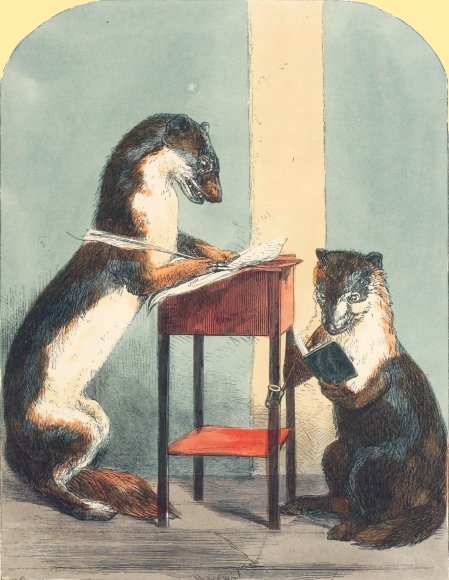
OLD MARTEN AND SHARP WEASEL, ESQ.
27“Good morning, Mr. Bantam,” said he.
“Good morning, sir,” said Bantam, shaking in every feather.
“I want you to do me a service, Bantam,” continued old Marten; “but you must not say one word of what I am going to tell you.”
Bantam promised this, as indeed he would have any thing else.
“You must go to Old Weasel of Holm-wood,” whispered Marten, laying his forepaws on Bantam’s breast to hold him near him, “and find his daughter. Tell her that young Ferret is a scapegrace and a good-for-nothing fellow, and that Judge Fox has sent him to prison. Then tell her that I am very rich, and that my son Longtail is making a handsome fortune by his school. This is a delicate matter, Bantam: if you manage cleverly, I will be your friend through life; if you betray me, mark this.” And the old man clapped his paw on the cutlass he usually wore by his side.
Bantam, glad to get out of his clutches on any terms, promised the strictest compliance, and flew rather than ran back to his farmyard as soon as he was released. There the first person he saw was his wife, who had returned, and was wondering what had 28 become of him. To her, of course, he told all his strange adventure, and she, silly thing, went immediately and cackled the whole story to Dame Goose; who told it to one of the young Goslings, who told it to old Mr. Drake; he quacked it about so loudly that his wife and children soon learned it; and in ten minutes there was not one in all Holm-farm who did not know of this wonderful adventure. As for performing his promise, we must do Mr. Bantam the credit of saying he never for a moment thought of being such a silly, for he well knew that the day which saw him enter Old Weasel’s house would be his last.
29
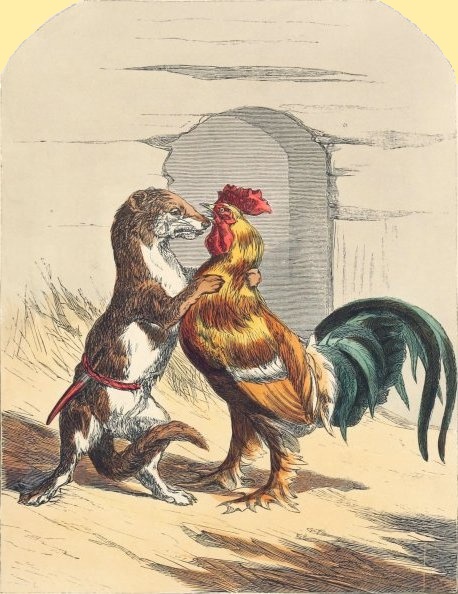
MR. BANTAM’S INTERVIEW WITH OLD MARTEN.
31CHAPTER III.
After old Marten had let Bantam go, he himself went straight to his son, whom he found engaged in his professional pursuits. At the moment of his father’s entry, young Longtail was hearing a class of the young Rabbits, on one of whom he was inflicting summary chastisement for great neglect and carelessness in his arithmetic. The poor young fellow was squeaking terribly, and his three brothers, with tears in their eyes, were trying with all their might to cast up their sums on their slates, which shook so in their hands that they could scarce see the figures. Their master left off the beating when he saw his father, and consequently young Rabbit, for the first and perhaps only time in his life, was very glad to see the old man. The class was dismissed; and if you had seen these four youngsters scamper off, shaking their white tails and jumping half a yard high as they ran to the 32 Warren, you would have thought it was a good thing to have the light-heartedness of children.
The Martens, father and son, retired up an oak-tree, at the old man’s request, to talk over their private affairs. When the son heard of his father’s plans, and how young Ferret had been arrested, he was struck dumb with amazement. He had never dreamed that his father would interfere in such a matter; and if the truth must be told, he was already engaged to Miss Pussy, the eldest daughter of old Mrs. Hare of the Ferns.
However, he knew better than to contradict his father’s intentions too suddenly, for he felt assured that the old man would cut him off with a shilling if he were to offend him; so he pretended to acquiesce in all that was said, and promised compliance in every particular.
But as soon as his father had bidden him farewell, and had got out of sight, young Longtail ran as fast as his legs would carry him to the cavern where the doctor was imprisoned, paid the amount of the debt for which he had been arrested, and took young Ferret home with him to consult about their future conduct.
33
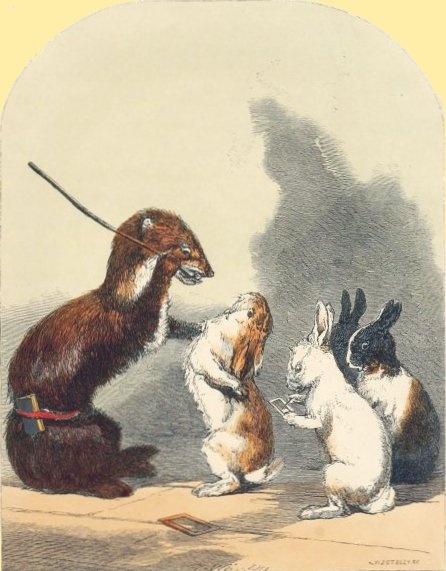
LONGTAIL TEACHING THE YOUNG RABBITS ARITHMETIC.
It would have amused you, could you have heard all the plans discussed by these young lovers for their joint benefit; how the 35 one talked of his darling Miss Weasel, and the other of his dear Miss Pussy; how they agreed that in matters of love every thing was allowable; and how they swore eternal friendship to each other throughout their lives.
Two days afterwards it was known all over Holm-wood that the fair Miss Weasel had eloped with Longtail Marten. Mrs. Goose and the four Miss Goslings were full of the information for every one they met. It was the finest piece of scandal they had known for years. “Only think,” said they, “after all her engagement to young Doctor Ferret, to go and take up with the schoolmaster; and all, forsooth, because Old Marten is rich!”
But scarce had the first news of Miss Weasel’s extraordinary behaviour run through the farm-yard, than old Bantam was seen hurrying in, very red in the face from over exertion, and was heard to declare, that he never knew the like of it, but as sure as he was a living cock, he had met young Ferret the physician running away with Miss Pussy, the daughter of old Mrs. Hare of the Ferns. Mrs. Goose turned up the whites of her eyes and almost fainted. Dame Partlett ran with all speed, that she might be the first to cackle the intelligence to Mr. Drake; and the whole island was soon in a ferment at this wonderful piece of gossip.
Of course, old Mr. Marten soon heard of all this; and so 36 pleased was he that he immediately altered his will, doubling the amount he had previously given to his dear boy Longtail, and getting so extremely excited at the “Huntsman and Hounds” on the same afternoon, that, sad to relate, he was untimely carried off by an effusion of blood.
And what think you became of the lovers? Why, the very day all this commotion happened at Holm-wood the two pair met at their aunt’s, old Mrs. Stoat’s, of Four-mile Cross, as they had agreed. There the young fellows, overjoyed at the success of their scheme, changed their fair partners, and, to complete their happiness, immediately set out for a tour on the neighbouring Continent.
There, on fine summer evenings, you might often have seen the doctor and his beloved quietly strolling by wood-sides and along the banks of the green meadows, listening intently to the warbling of the tender birds they loved so much; while young Longtail Marten and his bride, fonder of more boisterous excitement, devoted themselves to the pleasures of the chase, scouring rapidly over hill and dale whenever they heard the huntsman’s loud horn, or the hounds’ deeper notes; and never so happy as when, after the sports of the day were done, they finished up with a ball, and danced joyously till the next day’s dawn.
37
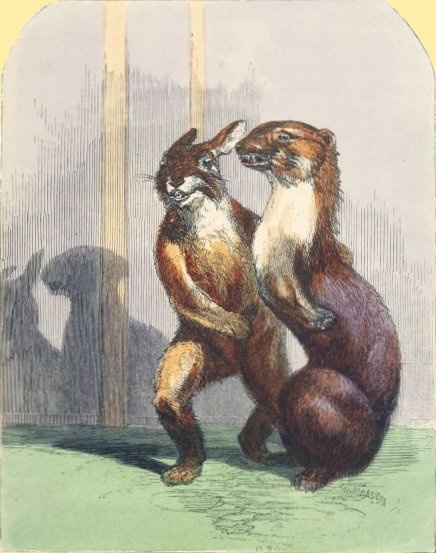
JACK HARE AND GRACE MARTEN LEADING OFF THE BALL.
39As for the good folks at Holm-wood, as soon as Mrs. Hare discovered that her daughter had run away, she sent for her eldest son, Jack Hare, who lived in a farm close by, and asked him to pursue his sister and bring her back; but Jack said she was quite old enough to know her own mind, and that he would have nothing to do with it. When, however, the old lady learned that her daughter was married to the rich young Marten, and not to the poor physician, then she was greatly rejoiced, though she confessed she could not make out why her dear child Pussy should run away with the doctor and then marry the schoolmaster; but she supposed it was all right.
As for Jack, when he heard that old Mr. Marten had died, leaving great riches behind him, he, to follow the fashion, fell in love with Grace, the only daughter of the deceased, and only sister of Longtail. Miss Grace listened favourably to Jack’s suit—for she was very lonely now her father was dead, and her brother away; and as there was no papa to consult in their case, they got married quietly at home, and asked all their neighbours to a ball, when Jack Hare and Grace Marten (that was) led off the polka in grand style, greatly to the admiration of all the young folks in the island.
40THE WONDERFUL HARE-HUNT.
Merrily sounded the cock’s shrill horn, and brightly shone the early morning sun, when a party of young sportsmen set out to the field, armed with their guns and game-bags. Four beaters from the neighbouring village attended them, each with a long stick to rout the hares and rabbits from their hiding-places. Gaily went they forth, these merry sportsmen and their helpers; light was their step across the green meadows and up the sandy hill-sides; loud was their laughter when one of them, trying to jump through a broken hedge, fell into the neighbouring ditch; great was their mirth when another’s gun went off and lamed a squirrel in an adjoining tree; and joyous was the shout with which they scared a frightened rabbit from its morning meal.
At last the sportsmen came to the side of a wood, and one of the beaters reported that just round the corner of the palings he could see nearly a dozen hares feeding together. A council of war was summoned; each sportsman looked to the priming of his gun, 41 and trod with a more cautious step; each beater bent his head nearly to the ground, and crept along the grass. A plan of attack was formed; the beaters stole within the wood to stop the hares that way, while the sportsmen suddenly appearing on the other side, caused the poor hares, surrounded as they were, to run into the very jaws of destruction. They that leaped towards the wood received blows on their heads from the beaters; they that ran down the hill met Ponto the dog, who pounced on them open-mouthed; and they that ran upwards were soon sent downwards again, toppling head over heels, killed by the fire of the enemy. Not a hare escaped. The gun-bearers took deadly aim, and Ponto and the beaters prevented their flight.
While the young sportsmen and their helpers were yet picking up the hares and rejoicing at their good fortune, the sky became quickly overcast, black clouds gathered, and a hurricane of wind swept through the wood, tearing off large branches of the trees. The sportsmen stood amazed at the suddenness of the storm, but presently their amazement was changed to fear; for, riding in a bright chariot drawn by six snow-white swans,—blown swiftly by the wind,—there appeared a lady of fairy-like beauty. At her command the beautiful birds stayed their flight, and the chariot rested on the green turf close by the sportsmen.
“Young men,” said the lady in a melodious but mournful 42 voice, as she pointed to the dead hares, “you have murdered these poor innocents for your sport: know, I am the fairy called Kindness, and these hares were all of them my friends. In punishment for your cruelty, you sportsmen shall be changed into Martens, and you attendants into Weasels. In such shapes you may pursue your cruel sports; you are not worthy of the forms of men.” And, waving her wand, the swans bore her instantly out of sight.
They who live in this country say that every old Michaelmas-day, five martens and four weasels, with long sticks, may still be seen hunting hares near this wood; sometimes a dog’s bark is heard and a shrill whistle, but if any of mankind appear in their sight, the creatures run quickly away, and hide themselves in the wood.
44
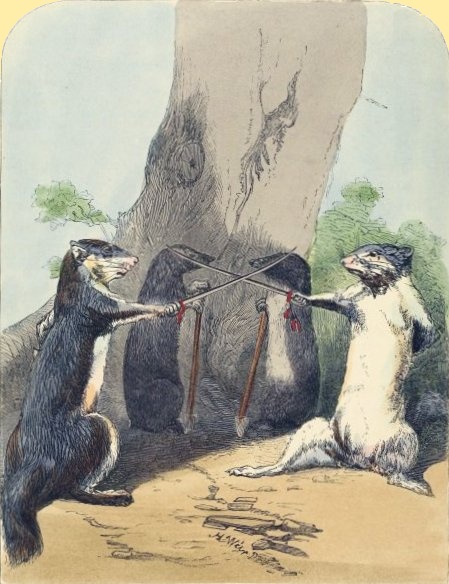
THE DUEL OF THE DORMICE.
45THE DUEL OF THE DORMICE.
Out in the fields, in the hollow of an old willow-tree, two Dormice slept the whole winter long. They neither ate nor drank, nor did they so much as raise their heads from their pillows during all this dreary time. A ray of sunshine, as the sun passed right over their tree, would perhaps make one of them stretch out his paws; but as soon as the gleam had passed and left them, he would curl himself up all the closer in his nest, and go faster asleep than ever.
But the sun came one bright spring morning, and shone on the Dormice so warmly, that they turned round in their bed, stretched their paws, rubbed their eyes, yawned, and at last woke quite up.
“It is summer-time at last,” said the elder Dormouse, as he took a nut from his store of provisions and cracked it, “and we may now leave our winter’s bed.” “I don’t believe it,” replied the younger. “The wind blows cold; I shall go to sleep again.”
“Ah, that’s like your laziness,” rejoined the elder; “sleep on; I’m off to the wood.” And so saying, he scrambled up the tree, then down the outside of the trunk, and so into the wide meadows.
The younger Dormouse went to sleep. He slept for an hour, then he woke again, and finding his companion gone, he turned to the food and ate a hearty meal; then he slept again, but the sun had made his bed too hot: so he presently woke and made another attack on the provisions; and this he did the whole day long, until, at evening time, all the corn and nuts which the two Dormice had so diligently collected in the autumn, were gone. Soon the moon rose, and the young one curled himself for sleep.
46In the meantime the elder had wandered about the fields; but the earth was wet, and no corn or fruit was ripe, so at night he returned to his nest wet and hungry. He ran straight to the store-room for food; but what was his surprise when he found nothing left but a few barley-corns! His cries woke his companion, from whom he demanded the provisions; the younger one muttered that he knew nothing about them, and pretended to sleep; but the unfortunate adventurer, driven to desperation by hunger, flew into a rage and struck the other with his claws: a fight ensued, and the whole neighbourhood was alarmed at the outcry.
Two Moles who were passing by the foot of the tree, hearing this dreadful noise, called out to the combatants to stop. The Dormice fearing it might be some of the Weasels who spoke, were silent instantly, and then the Moles bade them come out.
So the Dormice came down to the Moles; and when the Moles found that the silly creatures were bent on their quarrel, they insisted that the combat should be with swords. Moreover, they offered to play the part of seconds, and to dig a grave for the vanquished.
To all this the Dormice consented; the Moles found an old trap, and from the iron parts they fashioned rude swords. These they measured, and gave to the combatants; and then, with their long spades in their hands, they awaited the issue of the affray. It was fierce and desperate. The hungry one fought with fury, but he who had had a good feast was the stronger and the calmer: at last the younger one drove his sword right through the body of the elder; but the elder at the same moment clove his opponent’s head asunder, and so they fell dead together. And the Moles dug a deep hole, and buried both the Dormice in the same grave.
48
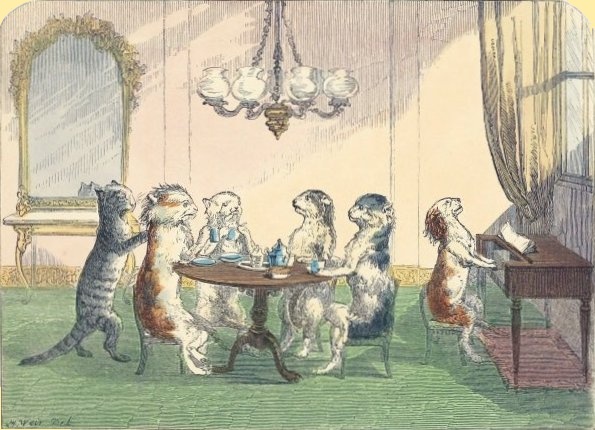
THE KITTENS AT TEA—MISS PAULINA SINGING.
49THE SIX KITTENS.
Once upon a time a cat had six kittens, whom she brought up in the most genteel manner. No one could say that their education was in any wise neglected, for besides being taught the ordinary duties of life by their mother, such as mouse-hunting, fish-stealing, and bird-catching, they received instructions in the arts of singing, and playing the harp and the piano, and were taught to waltz and dance the polka with every imaginable grace. Now when the kittens grew to be of age, it was their custom of an afternoon to spend some hours at tea and intellectual talk. The youngest always performed the duties of servant, while one of the elder ones would entertain the rest by playing airs from the latest opera, or singing a love-song, the music of which she had herself composed.
It is true some animals who dwelt close by complained of this music, and called it by all kinds of ill names; but that is ever the jealous way of the world: and the kittens frequently performed serenades in their garden by moonlight, when all who passed by would stay to listen to their melody.
But to our tale. It happened that, one fine summer’s afternoon, when the kittens were all enjoying themselves at tea; when Paulina, the eldest, was warbling some of her most delightful songs, and Violet, the second, was entertaining the rest, in an under tone, with a little bit of scandal about a neighbouring 50 Tabby, whom she had seen coming home in a sad condition about five o’clock in the morning, when she, Miss Violet, was taking her early walk;—just at this moment there sounded a tap at the door, and presently in came Diana, the youngest sister, bearing in her hand more cakes for tea, and in the plate with them a note addressed to Miss Rose,—the next to Violet in age, and by most people considered the beauty of the family. Violet took the letter eagerly from Diana; but when she saw the address, she remarked that it was evidently a gentleman’s handwriting, and tossing her head somewhat disdainfully, she handed it to Miss Rose, who blushed very much, and retired with it to the sofa. Rose opened the note with trembling paws, and a sweet smile played on her features as she read its contents; then, carefully folding it up, she observed to her sisters that it was merely an invitation for a walk, and springing on to the back of the sofa, she jumped through the open window, and retired to her own summer-house up a fine sycamore-tree in the garden.
This incident, as may be imagined, caused a great sensation among the sisters; and all wondered very much who could have been the writer of the note that had so evidently pleased Miss Rose. One hoped it was not from that scapegrace Tom who lived at the Farm-yard; another feared it might come from young Marten Sable of the Forest; and Violet demanded of her youngest sister what sort of person it was who had brought the note. Diana did not know, but believed it was a relation of old Mr. Weasel, who belonged to the same farm that Tom did. This set them all guessing again, for it was well known that Tom and Old Weasel did not speak to each other: and in the end they were all just as wise as in the beginning.
51
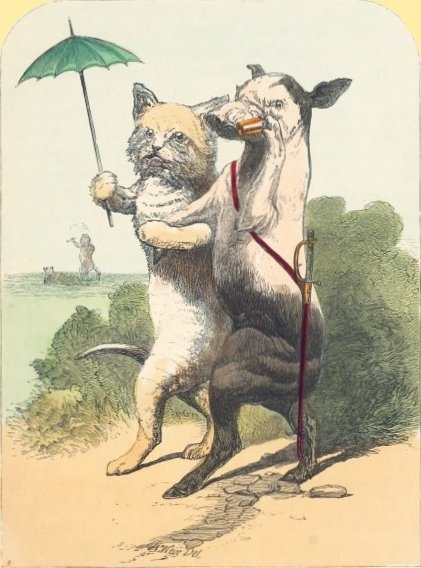
ENSIGN SQUEAKER AND MISS ROSE.
53About seven o’clock the same evening an attentive observer might have noticed Miss Rose emerging from her door very quietly, and making the best of her way to the green fields that bordered the sea-coast close by. An ill-natured person would have said that Miss Rose had taken especial pains with her toilet, and that she carried her parasol with a lack-a-daisical air; but Rose herself, at her last peep in the glass, had thought that she looked very nicely indeed; and so it would appear thought Ensign Squeaker (of the Household Pigade), who, with his regimental sword by his side, and his pocket telescope in his hand, sauntered along the pathway, merely to enjoy the beauty of the evening, and inhale the fresh breezes from the ocean. How it happened that Young Squeaker and Miss Rose met at the corner of the cliff, just as the village clock struck the half-past seven, no one knows; certain only it is that they did meet; and that after the interchange of the usual compliments, Miss Rose accepted Mr. Squeaker’s proffered arm, and that the pair wandered about by the sea-shore until the moon rose; and Miss Rose, in great trepidation at finding it so late, desired her companion to escort her home. Nor is it known what Mr. Squeaker said when he bade a fond adieu to his dear Rose, nor for how long after Rose sat in her arbour in the garden and watched the bats flitting across the moon.
It was noticed by the sisters that Rose was very quiet all the next day, and that at times a tear stood in the corner of her eye, which she would wipe away, sighing. Many were the sly allusions to the note of the previous afternoon and the long evening walk, and no one tormented poor Rose with her insinuations more than Paulina, who was for some cause in a most unusual flow of spirits. After tea, Rose took down her treasured volume, 54 “Pussicat’s Poems,” and retiring to the garden, read the tenderest parts. Violet, overcome with the fatigue of a recent mouse-hunt, went to sleep on the sofa; the younger ones busied themselves with their crochet and net-work; and Miss Paulina, saying she was going to call on a neighbour, with her best lace-bordered handkerchief in her hand, sallied forth and took her way towards the forest. Now it so happened that young Marten Sable was leaning against a tree, tapping his heel with his cane, and meditating very profoundly at the entrance of the very walk towards which Paulina bent her steps. He started at her approach, and with a sad but eager countenance ran to meet her.
“What has happened, Marten,” cried Paulina, “that you look so miserable? tell me directly, I implore you;” and placing her hand on his arm, she looked piteously in his face. Marten hung his head and seemed overcome with grief; at last he said in a low husky voice, “We must part, Paulina; but it will be only for a time; my father has ordered me to set out for Russia to visit his forests there, and, my darling Paulina,—how can I bear the thought!—it will be six months before I see you again.” Paulina covered her face with her paws and wept bitterly; at last rousing herself, she said, “Let us not, Marten, spend our last evening thus; come, six months will soon pass, and then—” Here Paulina’s voice dropped, and Marten threw his arms round her waist and kissed away the tears.
55
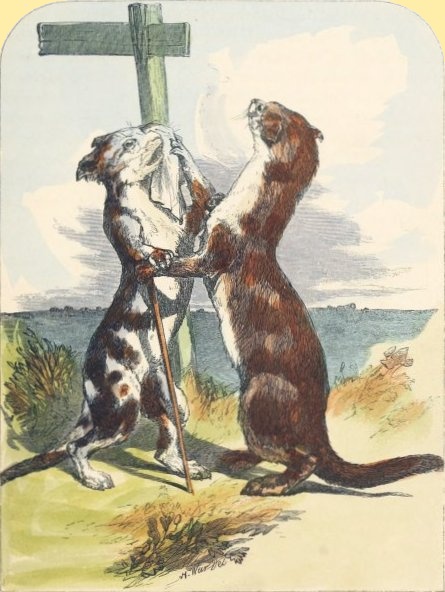
YOUNG MARTEN BIDDING FAREWELL TO MISS PAULINA.
We know of every word that Marten said to Paulina, and of Paulina’s every reply, for we had it all from a young hedgehog whose curiosity led her to listen to their talk; but we think that the hedgehog did wrong to listen, and so, perhaps, did we to listen 57 to the hedgehog, and so we will not tell their secrets; but this, we may mention, that they wandered up and down the pathways of the forest, now and then pouncing on a stray field-mouse or a poor sleeping bird, until the moon shone brightly through the trees. And we know that they parted at length by the sign-post at the edge of the wood, when Paulina shed many tears, and Marten, laying his paw upon his heart, vowed ever to be constant to her, and in all his travels and all his adventures to remember his sweet Pussy. To have seen how the poor kitten wept when she went to bed that night, would have grieved a hard-hearted terrier; and to have seen how melancholy she looked as she wandered about for three weeks afterwards, would have drawn pity from a ferocious bull-dog.
One morning, about seven months after the events we have narrated, there was a great commotion in the house where the kittens dwelt; the bells rang, the flags were hoisted, and little cannon fired. In the papers of the next morning we read that Ensign Squeaker of the Household Pigade carried off the beautiful Miss Rose, and young Marten Sable of the Forest his fair prize Miss Paulina, both on the same day.
May they all enjoy much felicity, and may the brides catch plenty of mice!
58
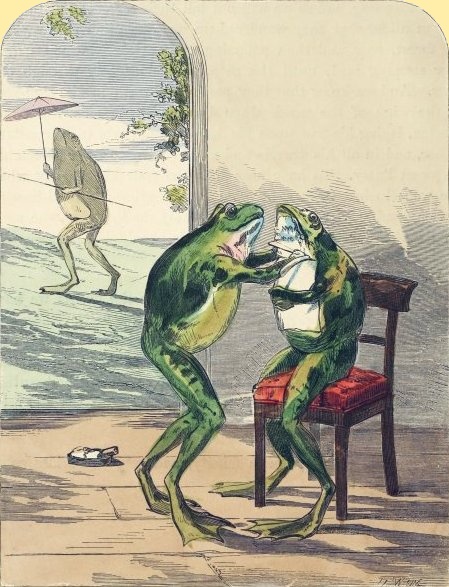
THE FROGS WHO WOULD A-WOOING GO.
59
THE
FROGS WHO WOULD A-WOOING GO.
Two frogs, who were cousins, were hopping about together one warm summer’s evening by the side of a rivulet, when they began talking—just as the men will talk—about a young lady-frog who lived in a neighbouring marsh. One extolled the brightness of her eyes, the other praised the beauty of her complexion, and somehow the two frogs found out that they had both fallen in love with the same young lady-froggy. When they had made this discovery they parted rather abruptly, and muttered something, the meaning of which was not very clear.
“Bless me,” said Mr. Croaker, the elder and richer of the two, “I must not let that young scapegrace Jumper get the better of me. A pretty joke indeed that he should think of the beautiful Miss Leapfrog, he who is not worth a rap, and is as ugly as a toad.”
“Who would have thought,” said Jumper to himself, “that that old curmudgeon Croaker was going to make love to that dear young Miss Leapfrog? We will soon see whom she likes best.”
The next morning Croaker dressed himself with unusual neatness; and that he might appear to better advantage, he went to a barber-frog who lived in a neighbouring arbour, and asked to be shaved and to have his wig dressed. The barber had just spread 60 his white cloth, had lathered his customer’s chin, and was flourishing a razor in his face, when what should catch Croaker’s eye through the open doorway but the figure of his cousin Jumper, smartly dressed, with his cane under his arm, and a parasol over his head, to keep the sun off his delicate complexion, walking hastily along the path that led to Miss Leapfrog’s residence.
To jump from his chair was Croaker’s first impulse, and, sad to say, it was his last; for he fell with his throat upon the edge of the barber’s razor, and in two minutes breathed his last.
Deep was Miss Leapfrog’s grief, and great was Mr. Jumper’s joy, when the news of this sad misfortune reached their ears. In the first burst of her anguish the young lady accused the barber of having murdered her dear Croaker; but Mr. Jumper hopped about for joy, and vowed that the barber was the best frog alive. And well he might be joyful, for as Croaker had died without a will, Jumper inherited all his estates; and when, after a week’s mourning, the young lady’s grief had somewhat subsided, the happy Mr. Jumper carried off the beautiful Miss Leapfrog.
But alas, how uncertain is happiness either to man or frogs! Two days afterwards, as Jumper was crossing a brook, a lily-white duck, who had been concealed by the rushes, flew at him with open beak and gobbled him up.
And the poor bride was left to mourn in silent solitude.
62
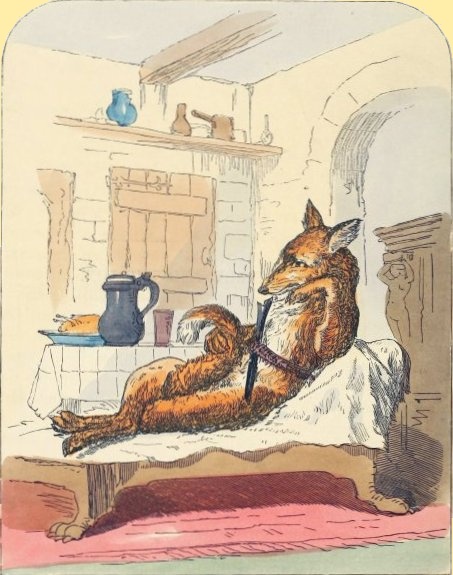
REYNARD AT HOME AT MALEPARDUS.
63THE STORY
OF
REYNARD THE FOX.
About the feast of Whitsuntide, when the woods were in their lustyhood and gallantry, when every tree was clothed in the green and white livery of glorious leaves and sweet-smelling blossoms, when the earth was covered with her fairest mantle of flowers, and the sweet birds entertained the groves with the delight of their harmonious songs, the Lion, the Royal King of Beasts, made solemn proclamation that all quadrupeds whatsoever should attend his court, and celebrate this great festival.
Now when the king had assembled all his subjects together, there was no one absent save Reynard the Fox, against whom many grievous accusations were laid. First came Isegrim the Wolf, with all his family and kindred, who, standing before the King complained loudly how that Reynard had ill-treated his wife and children. Then there came a little hound named Curtise, who accused the Fox of having stolen his pudding in the extreme cold winter-time, when he was nigh dying of starvation. But scarcely had the hound finished his tale, when, with a fiery countenance, in sprang Tibert the Cat, and accused Curtise of having stolen this pudding from himself, and declared that Reynard had righteously taken it away.
64Then rose the Panther: “Do you imagine, Tibert,” quoth he, “that Reynard ought not to be complained of? The whole world knows that he is a murderer, a vagabond, and a thief.”
Then quoth Grimbard the Badger, Reynard’s nephew: “It is a common proverb, Malice never spake well: what can you say against my kinsman the fox? All these complaints seem to me to be either absurd or false. Mine uncle is a gentleman, and cannot endure falsehood. I affirm that he liveth as a recluse; he chastiseth his body, and weareth a shirt of hair-cloth. It is above a year since he hath eaten any flesh; he hath forsaken his castle Malepardus, and abandoned all his wealth; he lives only upon alms and good men’s charities, doing infinite penance for his sins; so that he has become pale and lean with praying and fasting.”
While Grimbard was still speaking, there came down the hill Chanticleer the Cock, and with him two hens, who brought with them on a bier their dead sister Copple, who had just been murdered by Reynard. Chanticleer smote piteously his feathers, and, kneeling before the King, spake in this manner:
65
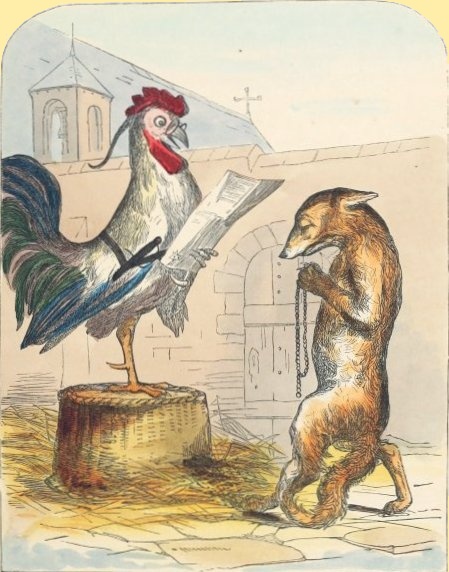
REYNARD IN THE LIKENESS OF A HERMIT.
“Most merciful and my great Lord the King, vouchsafe, I beseech you, to hear our complaint, and redress the injuries which Reynard the Fox has done to me and my children. Not longer ago than last April, when the weather was fair, and I was in the height of my pride and glory, because of my eight valiant sons and seven fair daughters, who were strong and fat, and who walked in safety in a yard well-fenced round, wherein also were several large dogs for their protection, Reynard, that false and dissembling traitor, came to me in the likeness of a hermit, and brought me a letter to read, sealed with your Majesty’s seal, in which I found written, that your Highness had made peace 67 throughout all your realm, and that no manner of beast or fowl should do injury one to another; affirming unto me, that, for his own part, he was become a monk, vowing to perform a daily penance for his sins; shewing unto me his beads, his books, and the hair shirt next to his skin; saying, in humble wise, unto me, ‘Sir Chanticleer, never henceforth be afraid of me, for I have vowed never more to eat flesh. I am now waxed old, and would only remember my soul; therefore I take my leave, for I have yet my noon and my evensong to say.’ Which spake, he departed, saying his Credo as he went, and laid him down under a hawthorn. At this I was exceeding glad, that I took no heed, but went and clucked my children together, and walked without the wall, which I shall ever rue; for false Reynard, lying under a bush, came creeping betwixt us and the gate, and suddenly surprised one of my children, which he trussed up and bore away, to my great sorrow; for, having tasted the sweetness of our flesh, neither hunter nor hound can protect or keep him from us. Night and day he waits upon us, with that greediness, that of fifteen of my children, he hath left me but four unslaughtered; and yesterday, Copple, my daughter, which here lieth dead on this bier, was, after her murder, rescued from him. This is my complaint, and this I leave to your Highness’s mercy to take pity on me, and the loss of my fair children.”
Then spake the King: “Sir Grimbard, hear you this of your uncle the recluse? he hath fasted and prayed well: believe me, if I live a year, he shall dearly abide it. As for you, Chanticleer, your complaint is heard, and shall be cured; to your daughter that is dead we will give the right of burial, and with solemn dirges bring her to the earth, with worship.”
After this the King sent for his lords and wisest counsellors, 68 to consult how this foul murder of Reynard’s might be punished. And in the end, it was concluded that Reynard should be sent for, and without all excuse, he should be commanded to appear before the King, to answer whatever trespasses should be objected against him; and that this message should be delivered by Bruin the Bear.
To all this the King gave consent, and calling the bear before him, he said, “Sir Bruin, it is our pleasure that you deliver this message; yet in the delivery thereof have great regard to yourself; for Reynard is full of policy, and knoweth how to dissemble, flatter, and betray; he hath a world of snares to entangle you withal, and without great exercise of judgment, will make a scorn and mock of the best wisdom breathing.”
“My Lord,” answered Sir Bruin, “let me alone with Reynard; I am not such a truant in discretion to become a mock to his knavery;” and thus, full of jollity, the bear departed.
The next morning Bruin set out in quest of the fox; and after passing through a dark forest and over a high mountain, he came to Malepardus, Reynard’s chiefest and most ancient castle. Reynard was at home, and pretended to be ill with eating too much honey. When the bear heard this, he was extremely desirous of knowing where such excellent food could be obtained; and Reynard promised to take him to a garden where he should find more honey-combs than ten bears could eat at a meal. But the treacherous rascal took him to a carpenter’s yard, where lay the trunk of a huge oak-tree, half-riven asunder, with two great wedges in it, so that the cleft stood a great way open. “Behold now, dear uncle,” said the fox, “within this tree is so much honey that it is unmeasurable.” The bear, in great haste, thrust his nose and fore-paws into the tree; and immediately Reynard pulled out the two great wedges, and caught Bruin in so sharp a trap, 69 that the poor beast howled with pain. This noise quickly brought out the carpenter, who, perceiving how matters stood, alarmed the whole village, who came and belaboured the bear’s sides with sticks and hoes and pitchforks, until, mad with rage, he tore his bleeding face and paws from the tree, and rushed blindly into a river that ran close by, knocking into the water with him many of the villagers, and among them, Dame Julock, the parson’s wife, for whose sake every one bestirred himself; and so poor Bruin got safe away. After some delay, the bear returned to the court, where, in dismal accents, he recounted the sad trick that Reynard had played him.
Then said the King, “Now, by my crown, I will take such revenge as shall make that traitor tremble;” and sending for his counsellors, they decided that Reynard should be again summoned to court, and that Tibert the Cat should be the bearer of the message. “It is your wisdom, Sir Tibert, I employ,” said the great King, “and not your strength: many prevail with art, when violence returns with lost labour.”
So Tibert made ready, and set out with the King’s letter to Malepardus, where he found the fox standing before his castle-gates; to whom Tibert said, “Health to my fair cousin Reynard; the King, by me, summons you to the court, in which if you fail, there is nothing more assured unto you than a cruel and a sudden death.”
The fox answered, “Welcome, dear cousin Tibert; I obey your command, and wish my Lord the King infinite days of happiness; only let me entreat you to rest with me to-night, and take such cheer as my simple house affordeth, and to-morrow, as early as you will, we will go towards the court, for I have no kinsman I trust so dearly as yourself.”
70Tibert replied, “You speak like a noble gentleman; and me-thinks it is best now to go forward, for the moon shines as bright as day.”
“Nay, dear cousin,” said the fox, “let us take the day before us, so may we encounter with our friends; the night is full of danger.”
“Well,” said the cat, “if it be your pleasure, I am content; what shall we eat?”
Reynard said, “Truly my store is small; the best I have is a honey-comb, pleasant and sweet; what think you of it?”
To which Tibert replieth, “It is meat I little respect, and seldom eat; I had rather have one mouse than all the honey in Europe.”
“A mouse!” said Reynard; “why, my dear cousin, here dwelleth a priest hard by, who hath a barn by his house so full of mice, that I think half the wagons in the parish are not able to bear them.”
“Oh, dear Reynard,” quoth the cat, “do but lead me thither, and make me your servant for ever.”
“Why,” said the fox, “love you mice so exceedingly?”
“Beyond expression,” quoth the cat.
71

SIR TIBERT DELIVERING THE KING’S MESSAGE.
Then away they went with all speed to the priest’s barn, which was well walled about with a mud wall, where, but the night before, the fox had broken in and stolen an exceeding fat hen, at which the priest was so angry, that he had set a snare before the hole to catch him at his next coming, which the false fox knew of; and therefore said to the cat, “Sir Tibert, creep in at this hole, and believe it, you shall not tarry a minute’s space but you shall have more mice than you are able to devour; hark, you may hear how they peep. When you have eaten your fill, come again, and I will stay and await for you here at this hole, that 73 to-morrow we may go together to the court; but, good cousin, stay not too long, for I know my wife will hourly expect us.”
Then Tibert sprang quickly in at the hole, but was presently caught fast by the neck in the snare, which as soon as the cat felt, he quickly leaped back again; and the snare running close together, he was half-strangled, so that he began to struggle and cry out and exclaim most piteously.
Then the priest, hearing the outcry, alarmed all his servants, crying out, “The Fox is taken!” and away they all ran to where poor Tibert was caught in the snare, and, without finding out their mistake, they beat him most unmercifully, and cruelly wounded one of his eyes. The cat, mad with pain, suddenly gnawed the cord, and seizing the priest by the legs, bit him and tore him in such a way that he fell down in a swoon, and then, as every one ran to help his master, Tibert leaped out of the hole, and limped as fast as his wounded legs would carry him to the court, where the King was infinitely angry at the treatment he had received.
Then Grimbard the Badger, Reynard’s nephew, fearing it was likely to go hard with his uncle, offered to go to Malepardus and take the King’s message to his most subtle kinsman; to which his Majesty graciously consented. So Grimbard set forth; and when he came to Malepardus, he found Reynard with Dame Ermelin his wife sporting with their children. When Grimbard had delivered the King’s letter, Reynard found that it would be better for him to shew himself at court at once; so bidding an affectionate farewell to his dear wife and children, he immediately set out with the badger to go with him before the King. On his way, Reynard, remembering the heavy crimes he had committed, and fearing that his end was at hand, desired of the holy Grimbard, who had always led a hermit’s life, that he would hear 74 him confess, and set him a penance for his sins. Grimbard bade him proceed. And the fox confessed how shamefully he had ill-used the bear, and the cat, and the wolf, and Chanticleer’s children, and many other ill-doings during his life; and when he had finished, he knelt before Grimbard, and said, “Thus have I told you my wickedness; now order my penance, as shall seem fit in your discretion.”
Grimbard was both learned and wise; and therefore brake a rod from a tree, and said, “Uncle, you shall three times strike your body with this rod, and then lay it down upon the ground, and spring three times over it without bowing your legs or stumbling; then shall you take it up and kiss it gently, in sign of meekness and obedience to your penance; which done, you are absolved of your sins committed up to this day, for I pronounce unto you clear remission.”
At this the fox was exceeding glad; and immediately he performed the penance to Grimbard’s satisfaction. But as they went journeying on, it happened that they passed by the poultry-yard of a convent; and as one young cock strayed far from the rest, Reynard leaped at him, and caught him by the feathers, but the cock escaped.
“Villain that you are,” said Grimbard, “will you, for a silly pullet, fall again into your sins?”
To which Reynard answered, “Pardon me, dear nephew, I had forgotten myself; but I will ask forgiveness, and mine eye shall no more wander.”
However, Grimbard noted that he turned many times to look at the poultry. But soon afterwards they arrived at the court.
As soon as it was bruited in the court that Reynard the Fox and Grimbard his kinsman were arrived there, every one, from 75 the highest to the lowest, prepared himself to complain of the fox; at which Reynard’s heart quaked, but his countenance kept the old look, and he went as proudly as ever he was wont with his nephew through the high street, and came as gallantly into the court as if he had been the King’s son, and as clear from trespass as the most innocent whosoever; and when he came before the chair of state in which the King sat, he said, “Heaven give your Majesty glory and renown above all the princes of the earth.”
But the King cut him short at these words, and said: “Peace, traitorous Reynard; think you I can be caught with the music of your words? no, it hath too oft deceived me; the peace which I commanded and swore unto, that have you broken.”
Then Bellin the Ram, and Oleway his wife, and Bruin the Bear, and Tibert the Cat, and Isegrim the Wolf, and Kyward the Hare, and Bruel the Goose, and Baldwin the Ass, and Bortle the Bull, and Hamel the Ox, and Chanticleer the Cock, and Partlett the Hen, and many others, came forward; and all these with one entire noise cried out against the fox, and so moved the King with their complaints, that the fox was taken and arrested.
Upon this arrest, a parliament was called; and notwithstanding that he answered every objection severally, and with great art, Reynard was condemned, and judgment was given that he should be hanged till his body was dead; at which sentence the fox cast down his head, for all his jollity was lost, and no flattery nor no words now prevailed.
Then Isegrim on the one side and Bruin on the other led the poor fox to the gallows, Tibert running before with the halter. And when they were come to the place of execution, the King and the Queen, and all the rest of the nobility, took their places to see the fox die.
76When all things were prepared, the fox said: “Now my heart is heavy, for death stands in all his horror before me, and I cannot escape. My dread Lord the King, and you my sovereign Lady the Queen, and you my lords that stand to behold me die, I beseech you grant me this charitable boon, that I may unlock my heart before you, and clear my soul of her burdens, so that hereafter no man may be blamed for me; which done, my death will be easy.”
Every creature now took compassion on the fox, and said his request was small, beseeching the King to grant it, which was done; and then the fox thus spake: “Help me, Heaven, for I see no man here whom I have not offended; yet was this evil no natural inclination in me, for in my youth I was accounted as virtuous as any breathing. This know, I have played with the lambs all the day long, and taken delight in their pretty bleating; yet at last in my play I bit one, and the taste of its blood was so sweet unto me, that I approved the flesh, and both were so good, that since I could never forbear it. This liquorish humour drew me into the woods amongst the goats, where hearing the bleating of the little kids, I slew one of them, and afterwards two more, which slaughter made me so hardy, that then I fell to murder hens, geese, and other poultry. And thus my crimes increased by custom, and fury so possessed me, that all was fish which came to my net. After this, in the winter season, I met with Isegrim, where, as he lay hid under a hollow tree, he unfolded unto me how he was my uncle, and laid the pedigree down so plain, that from that day forth we became fellows and companions; which knot of friendship I may ever curse, for then began the flood of our thefts and slaughters. He stole the great things, I the small; he murdered nobles, I the mean subjects; and in all our actions his share was still ever the greatest: when he got a ram or a calf, 77 his fury would hardly afford me the horns to pick on; nay, when he had an ox or a cow, after himself, his wife, and his seven children were served, nothing remained to me but the bare bones to pick. This I speak not in that I wanted (for it is well known I have more plate, jewels, and coin than twenty carts are able to carry), but only to shew his ingratitude.”
When the King heard him speak of this infinite treasure and riches, his heart grew inflamed with a desire thereof; and he said, “Reynard, where is that treasure you speak of?”
The fox answered: “My Lord, I shall willingly tell you, for it is true the wealth was stolen; and had it not been stolen in that manner which it was, it had cost your highness your life (which Heaven, I beseech, keep ever in protection).”
When the Queen heard that dangerous speech, she started, and said: “What dangers are these you speak of, Reynard? I do command you, upon your soul’s health, to unfold these doubtful speeches, and to keep nothing concealed which concerns the life of my dread Lord.”
Then the fox in these words unfolded to the King and Queen this most foul treason: “Know, then, my dread sovereign Lord the King, that my father, by a strange accident, digging in the ground, found out King Ermerick’s great treasure,—a mass of jewels infinite and innumerable; of which being possessed, he grew so proud and haughty, that he held in scorn all the beasts of the wilderness, which before had been his kinsmen and companions. At last he caused Tibert the Cat to go into the vast forest of Arden to Bruin the Bear, and to tender to him his homage and fealty; and to say that if it would please him to be king, he should come into Flanders, where he would shew him means how to set the crown upon his head. Bruin was glad of this embassage (for 78 he was exceeding ambitious, and had long thirsted for sovereignty), and thereupon came into Flanders, where my father received him nobly. Then presently he sent for the wise Grimbard, my nephew, and for Isegrim the Wolf, and for Tibert the Cat; then these five coming between Gaunt and the village called Elfe, they held a solemn council for the space of a whole night, in which, by the assistance of the evil one, and the strong confidence of my father’s riches, it was there concluded that your Majesty should be forthwith murdered; which to effect, they took a solemn oath in this manner: the bear, my father, the badger, and the cat, laying their hands on Isegrim’s crown, swore, first to make Bruin their king, and to place him in the chair of estate at Acon, and to set the imperial diadem on his head; and if by any of your Majesty’s blood and alliance they should be gainsaid, that then my father with his treasure should hire those which should utterly chase and root them out of the forest. Now after this determination held and finished, it happened that my nephew Grimbard being on a time high flown with wine, he discovered this dread plot to Dame Slopecade his wife, commanding her upon her life to keep secret the same; but she, forgetful of her charge, disclosed it in confession to my wife, as they went a pilgrimage over an heath, with like conjuration of secrecy. But she, woman-like, contained it no longer than till she met with me, and gave me a full knowledge of all that had passed, yet so as by all means I must keep it secret too, for she had sworn by the three kings of Cologne never to disclose it: and withal she gave me such assurance by certain tokens, that I right well found all was true which she had spoken; insomuch that the very affright thereof made my hair stand upright, and my heart become like lead, cold and heavy in my bosom.
79“But to proceed from this sorrow, I began to meditate how I might undo my father’s false conspiracies, who sought to bring a base traitor and a slave into the throne imperial; for I well perceived, as long as he held the treasure, there was a possibility of deposing your Majesty. And this troubled my thought exceedingly, so that I laboured how I might find out where my father’s treasure was hid; and to that end I watched and attended night and day in the woods, in the bushes, and in the open fields; nay in all places wheresoever my father laid his eyes, there was I ever watching and attending. Now it happened on a time, as I was laid down flat on the ground, I saw my father come running out of a hole, and as soon as he was come out, he gazed round about him, to see if any discovered him; then seeing the coast clear, he stopped the hole with sand, and made it so even, smooth, and plain, that no curious eye could discern a difference betwixt it and the other earth; and where the print of his foot remained, that with his tail he stroked over, and with his mouth so smoothed, that no man might perceive it: and indeed that and many other subtilties I learned of him there at that instant. When he had thus finished, away he went towards the village about his private affairs. Then went I presently towards the hole, and notwithstanding all his subtilty, I quickly found it out; and then entered I the cave, where I found that innumerable quantity of treasure, which cannot be expressed; which found, I took Ermelin my wife to help me; and we ceased not, day nor night, with infinite great toil and labour, to carry and convey away this treasure to another place, much more convenient for us, where we laid it safe from the search of any creature.
“Thus by my art only was the treason of Bruin defeated, for which I now suffer. From hence sprang all my misfortune, as thus: those foul traitors, Bruin and Isegrim, being of the King’s 80 privatest council, and sitting in high and great authority, tread upon me, poor Reynard, and work my disgrace, notwithstanding, for your Majesty’s sake, I have lost my natural father. O my dread Lord, what is he, or who can tender you a better affection, thus to lose himself to save you?”
Then the King and Queen, having great hope to get this inestimable treasure from Reynard, took him from the gibbet; and the King taking a straw from the ground, pardoned the fox of all his trespasses which either he or his father had ever committed. If the fox now began to smile, it was no wonder; the sweetness of life required it: yet he fell down before the King and Queen, and humbly thanked them for mercy, protesting that for that favour he would make them the richest princes in the world.
Then the King began to inquire where all these treasures were hid, and Reynard told that he had hid them in a wood called Hustreloe, near a river named Crekinpit. But when the King said that he had never heard of such a place, Reynard called forth Kyward the Hare from among the rest of the beasts, and commanded him to come before the King, charging him, upon his faith and allegiance which he bore to the King and Queen, to answer truly to such questions as he should ask him.
The hare answered, “I will speak truth in all things, though I were sure to die for the same.”
Then the fox said, “Know you not where Crekinpit floweth?”
“Yes,” said the hare, “I have known it any time these dozen years; it runneth in a wood called Hustreloe, upon a vast and wide wilderness.”
“Well,” said the fox, “you have spoken sufficiently; go to your place again;” so away went the hare.
Then said the fox, “My sovereign Lord the King, what say you now to my relation; am I worthy your belief or no?”
81

REYNARD BRINGS FORWARD THE HARE AS HIS WITNESS.
83The King said, “Yes, Reynard, and I beseech thee excuse my jealousies; it was my ignorance which did thee evil; therefore forthwith make preparation that we may go to this pit where the treasure lieth.”
But the fox answered that he could not go with his Majesty without dishonour; for that at present he was under excommunication, and that it was necessary that he should go to Rome to be absolved, and that from thence he intended to travel in the Holy Land. “The course you propose is good,” said the King; “go on and prosper in your intent.”
Then the King mounted on a rock, and addressing his subjects, told them how that, for divers reasons best known to himself, he had freely given pardon to Reynard, who had cast his wickedness behind him, and would no more be guilty of wrongdoing; and furthermore, he commanded them all to reverence and honour not only Reynard, but also his wife and children. At this, Isegrim the Wolf and Bruin the Bear inveighed against the fox in such an unseemly way, that his Majesty caused them both to be arrested for high treason. Now when the fox saw this, he begged of the Queen that he might have so much of the bear’s skin as would make him a large scrip for his journey; and also the skin of the wolf’s feet for a pair of shoes, because of the stony ways he would have to pass over. To this the Queen consented, and Reynard saw his orders executed.
The next morning Reynard caused his new shoes to be well oiled, and made them fit his feet as tightly as they had fitted the wolf’s. And the King commanded Bellin the Ram to say mass before the fox; and when he had sung mass and used many ceremonies over the fox, he hung about Reynard’s neck his rosary of beads, and gave him into his hands a palmer’s staff.
84Then the King took leave of him, and commanded all that were about him, except the bear and the wolf, to attend Reynard some part of his journey. Oh! he that had seen how gallant and personable Reynard was, and how well his staff and his mail became him, as also how fit his shoes were for his feet, it could not have chosen but have stirred in him very much laughter. But when they had got onward on their way, the fox entreated all the beasts to return and pray for him, and only begged of Bellin the Ram and Kyward the Hare that they would accompany him as far as Malepardus.
Thus marched these tree together; and when Reynard was come to the gates of his own house, he said to Bellin, “Cousin, I will entreat you to stay here without a little, whilst I and Kyward go in.” Bellin was well content; and so the fox and the hare went into Malepardus, where they found Dame Ermelin lying on the ground with her younglings about her, who had sorrowed exceedingly for the loss and danger of her husband; but when she saw his return, her joy was ten times doubled. But beholding his mail, his staff, and his shoes, she grew into great admiration, and said, “Dear husband, how have you fared?” so he told all that had passed with him at the King’s court, as well his danger as his release, and that now he was to go a pilgrimage. As for Kyward, he said the King had bestowed him upon them, to do with him what they pleased, affirming that Kyward was the first that had complained of him, for which, questionless, he vowed to be sharply revenged.
85
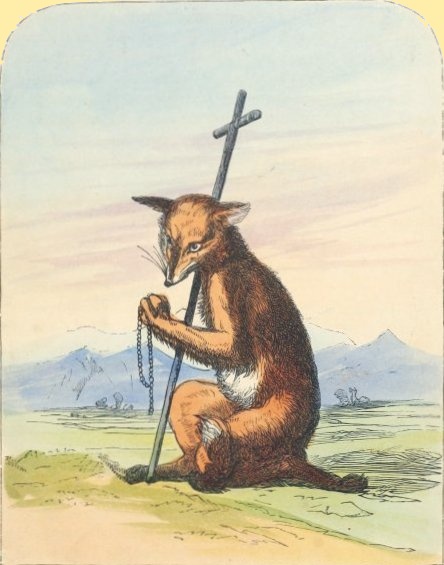
REYNARD ON HIS PILGRIMAGE TO ROME.
When Kyward heard these words, he was much appalled, and would fain have fled away; but he could not, for the fox had got between him and the gate; who presently seized the hare by the neck, at which the hare cried unto Bellin for help, but could not 87 be heard, for the fox in a trice had torn out his throat; which done, he, his wife, and young ones feasted therewith merrily, eating the flesh, and drinking to the King’s health.
All this while stood Bellin the Ram at the gate, and grew exceeding angry both against the fox and the hare, that they made him wait so long; and therefore called out aloud for Reynard to come away, which when Reynard heard, he went forth, and said softly to the ram, “Good Bellin, be not offended for Kyward is in earnest conference with his dearest aunt, and entreated me to say unto you, that if you would please to walk before he would speedily overtake you, for he is light of foot and speedier than you: nor will his aunt part with him thus suddenly, for she and her children are much perplexed at my departure.”
“Ay, but,” quoth Bellin, “methought I heard Kyward cry for help.”
“How, cry for help? can you imagine he shall receive hurt in my house? far be such a thought from you; but I will tell you the reason. As soon as we were come into my house, and that Ermelin my wife understood of my pilgrimage, presently she fell down in a swoon, which when Kyward saw, he cried aloud, ‘O Bellin come, help my aunt, she dies, she dies!’”
Then said the ram: “In sadness I mistook the cry, and thought the hare had been in danger.”
“It was your too much care of him,” said the fox. “But, letting this discourse pass, you remember, Bellin, that yesterday the King and his council commanded me that, before I departed from the land, I should send unto him two letters, which I have made ready, and will entreat you, my dearest cousin, to bear them to his Majesty.”
The ram answered: “I would willingly do you the service if 88 there be nothing but honourable matter contained in your letters; but I am unprovided of any thing to carry them in.”
The fox said: “That is provided for you already, for you shall have my mail, which you may conveniently hang about your neck; I know they will be thankfully received of his Majesty, for they contain matter of great importance.”
Then Bellin promised to carry them. So the fox returned into his house, and took the mail, and put therein the head of Kyward, and brought it to the ram, and gave him a great charge not to look therein till it was presented to the King, as he did expect the King’s favour; and that he might further endear himself with his Majesty, he bade the ram take upon him the inditing of the letters, “which will be so pleasing to the King, that questionless he will pour upon you many favours.”
This said, Bellin took leave of the fox and went toward the court, in which journey he made such speed, that he came thither before noon, where he found the King in his palace sitting amongst the nobility.
The King wondered when he saw the ram come in with the mail which was made of the bear’s skin, and said: “Whence comest thou, Bellin, and where is the fox, that you have that mail about you?”
Bellin answered: “My dread Lord, I attended the noble fox to his house, where, after some repose, he desired me to bear certain letters to your Majesty of infinite great importance, to which I easily consented. Wherefore he delivered me the letters enclosed in this mail, which letters I myself indited, and I doubt not but they are such as will give your highness both contentment and satisfaction.” Presently the King commanded the letters to be delivered to Bocart, his secretary, who was an excellent linguist 89 and understood all languages, that he might read them publicly; so that he and Tibert the Cat took the mail from Bellin’s neck, and opening the same, instead of letters they drew out the head of Kyward the Hare, at which being amazed, they said: “Wo and alas, what letters call you these? Believe it, my dread Lord, here is nothing but the head of poor murdered Kyward.”
Which the King seeing, he said: “Alas, how unfortunate was I to believe the traitorous fox!” And with that, being oppressed with anger, grief, and shame, he held down his head for a good space, and so did the Queen also. But in the end, shaking his curled locks, he groaned out such a dreadful noise, that all the beasts of the forest did tremble to hear it.
Then the King, full of wrath, commanded the bear and the wolf to be released from prison, and gave to them and to their heirs for ever Bellin and all his generation.
Thus was peace made between the King and these nobles, and Bellin the Ram was forthwith slain by them; and all these privileges doth the wolf hold to this hour, nor could ever any reconcilement be made between the wolf’s and the ram’s kindred. When this peace was thus finished, the King, for joy thereof, proclaimed a feast to be held for twelve days after, which was done with all solemnity.
To this feast came manner all of wild beasts, for it was known through the whole kingdom, nor was there wanting any pleasure that could be imagined. Also to this feast resorted abundance of feathered fowl, and all other creatures that held peace with his Majesty, and no one missing but the fox only.
Now after this feast had thus continued in all pomp the space of eight days, about high noon came Laprell the Rabbit before the King and Queen, as they sat at dinner, and with a 90 heavy and lamentable voice said: “My gracious and great Lord, have pity upon my misery and attend to my complaint, which is of great violence which Reynard the Fox would yesterday have committed against me. As I passed by the castle of Malepardus, supposing to go peaceably towards my nest, I saw the fox, standing without his gates, attired like a pilgrim and telling his beads so devoutly, that I saluted him; but he, returning no answer, stretched forth his right foot, and with his pilgrim’s staff gave me such a blow on the neck between the head and shoulders, that I imagined my head had been stricken from my body; but yet so much memory was left me that I leaped from his claws, though most grievously hurt and wounded. At this he was wrathful extremely, because I escaped; only of one of my ears he utterly deprived me, which I beseech your Majesty in your royal nature to pity, and that this bloody murderer may not live thus to afflict your poor subjects.”
The royal King was much moved with anger when he heard this complaint, so that his eyes darted out fire amongst the beams of majesty; his countenance was dreadful and cruel to look on, and the whole court trembled to behold him. In the end he said: “By my crown, I will so revenge these outrages committed against my dignity, that goodness shall adore me, and the wicked shall die with the remembrance; his falsehood and flattery shall no more get belief in me. Is this his journey to Rome and to the Holy Land? are these the fruits of his mail, his staff, and other ornaments becoming a devout pilgrim? Well, he shall find the reward of his treason. I will besiege Malepardus instantly, and destroy Reynard and his generation from the earth for ever.”
91
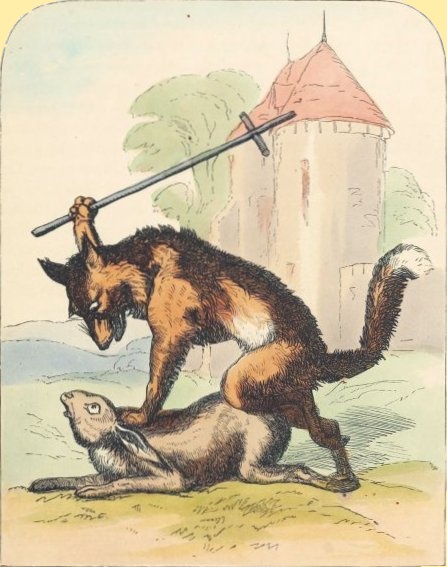
REYNARD ATTACKETH LAPRELL THE RABBIT.
When Grimbard heard this, he grew exceedingly sorry, and stealing from the rest, he made all haste to Malepardus, and 93 told to his uncle all that had happened. Reynard received him with great courtesy, and the next morning accompanied him back to court, confessing on his way many heinous sins, and obtaining absolution from the badger. The King received him with a severe and stately countenance, and immediately asked him touching the complaint of Laprell the Rabbit.
To which Reynard made answer: “Indeed, sire, what Laprell received he most richly deserved. I gave him a cake when he was hungry; and when my little son Rossel wanted to share a bit, the rabbit struck him on the mouth and made his teeth bleed; whereupon my eldest son Reynardine forthwith leaped upon him, and would have slain him had I not gone to the rescue.” Then the rabbit, fearing Reynard, stole away out of court.
“But,” quoth the King, “I must charge you with another foul treason. When I had pardoned all your great transgressions, and you had promised me to go a pilgrimage to the Holy Land; when I had furnished you with mail, scrip, and all things fitting that holy order; then, in the greatest despite, you sent me back in the mail, by Bellin the Ram, the head of Kyward the Hare; a thing so notoriously to my disgrace and dishonour, that no treason can be fouler.”
Then spake Reynard to the King, and said, “Alas, my sovereign Lord, what is that you have said? Is good Kyward the Hare dead? Oh, where is then Bellin the Ram, or what did he bring to your Majesty at his return? For it is certain I delivered him three rich and inestimable jewels, I would not for the wealth of India they should be detained from you; the chief of them I determined for you my Lord the King, and the other two for my sovereign Lady the Queen.”
“But,” said the King, “I received nothing but the head of 94 poor murdered Kyward, for which I executed the ram, he having confessed the deed to be done by his advice and counsel.”
“Is this true?” said the fox; “then wo is me that ever I was born, for there are lost the goodliest jewels that ever were in the possession of any prince living; would I had died when you were thus defrauded, for I know it will be the death of my wife, nor will she ever henceforth esteem me.”
Then Reynard told the King and Queen of the great value of these inestimable jewels. One was a gold ring, another a comb polished like unto fine silver, and the third was a glass mirror; and so great were the virtues of this rare glass that Reynard shed tears to think of the loss of it. When the fox had told all this, he thus concluded: “If any one can charge me with crime and prove it by witness, here I stand to endure the uttermost the law can inflict upon me; but if malice only slander me without witness, I crave the combat, according to the law and instance of the court.”
Then said the King, “Reynard, you say well, nor know I any thing more of Kyward’s death than the bringing of his head unto me by Bellin the Ram; therefore of it I here acquit you.”
“My dear Lord,” said the fox, “I humbly thank you; yet is his death grievous unto me.”
But Isegrim the Wolf was not content with this conclusion, and defied the fox to mortal combat. This challenge the fox accepted; and the next day was appointed for the meeting.
When all the ceremonies were done, and none but the combatants were in the lists, the wolf went toward the fox with infinite rage and fury, thinking to take him in his fore-feet; but the fox leaped nimbly from him, and the wolf pursued him, so that there began a tedious chase between them, on which their friends gazed. The wolf taking larger strides than the fox, often overtook 95 him, and lifted up his feet to strike him; but the fox avoided the blow, and smote him on the face with his tail, so that the wolf was stricken almost blind, and was forced to rest while he cleared his eyes; which advantage when Reynard saw, he scratched up the dust with his feet, and threw it in the eyes of the wolf. This grieved him worse than the former, so that he durst follow him no longer, for the dust and sand sticking in his eyes smarted so sore, that of force he must rub and wash it away; which Reynard seeing, with all the fury he had he ran upon him, and with his teeth gave him three sore wounds on his head.
Then the wolf being enraged, said, “I will make an end of this combat, for I know my very weight is able to crush him to pieces; and I lose much of my reputation, to suffer him thus long to contend against me.” And this said, he struck the fox again so sore a blow on the head with his foot, that he fell down to the ground; and ere he could recover himself and arise, the wolf caught him in his feet and threw him under him, lying upon him in such wise, as if he would have pressed him to death.
Then the fox bethought himself how he might best get free; and thrusting his hand down, he caught the wolf fast by the belly, and he wrung him so extremely hard thereby, that he made him shriek and howl out with the anguish, and in the end the wolf fell over and over in a swoon; then presently Reynard leaped upon him, and drew him about the lists and dragged him by the legs, and struck, wounded, and bit him in many places, so that the whole field might take notice thereof.
Then a great shout was raised, the trumpets were sounded, and every one cried, “Honour to the fox for this glorious conquest.” Reynard thanked them all kindly, and received their congratulations with great joy and gladness. And, the marshals going 96 before, they went all to the King, guarding the fox on every side, all the trumpets, pipes, and minstrelsy sounding before him.
When Reynard came before the King he fell on his knees, but the King bade him stand up, and said to him, “Reynard, you may well rejoice, for you have won much honour this day; therefore here I discharge you, and set you free to go whither your own will leads you.” So the court broke up, and every beast returned to his own home.
With Reynard, all his friends and kinsfolk, to the number of forty, took their leave also of the King, and went away with the fox, who was no little glad that he had sped so well, and stood so far in the King’s favour; for now he had power enough to advance whom he pleased, and pull down any that envied his fortune.
After some travel the fox and his friends came to his borough or castle of Malepardus, where they all, in noble and courteous manner, took leave of each other, and Reynard did to every one of them great reverence, and thanked them for the love and honour he had received from them, protesting evermore to remain their faithful servant, and to send them in all things wherein his life or goods might be available unto them; and so they shook hands and departed.
Then the fox went to Dame Ermelin his wife, who welcomed him with great tenderness; and to her and her children he related at large all the wonders which had befallen him at court, and missed no tittle or circumstance therein. Then grew they proud that his fortune was so excellent; and the fox spent his days from thenceforth, with his wife and children, in great joy and content.

